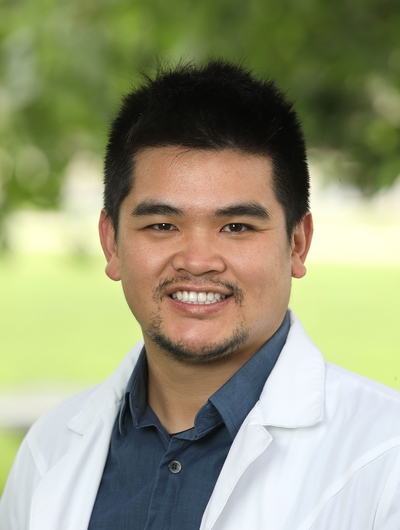
Joe T. Nguyen, D.D.S., Ph.D.
Assistant Clinical Investigator
Surgical Oncology Program
NCI/CCR
Research Topics
Organismal growth relies on conserved nutrient sensing pathways, such as mechanistic Target of Rapamycin (mTOR) signaling, that respond to presence or absence of amino acids, growth factors, and nutrients to regulate cellular metabolism. Dysregulation of mTOR signaling can contribute to several human diseases. mTOR signaling has been divided into unique macromolecular protein complexes where mTOR is defined by the binding partners, RAPTOR (mTORC1), RICTOR (mTORC2), and mEAK-7 (mTORC3). In head and neck cancers (HNC), the mTOR signaling pathway has emerged as a critical player, often being dysregulated. Aberrant mTOR signaling can drive tumorigenesis, fostering cancer cell proliferation, survival, and resistance to therapy. The pathway's significance in HNC is underscored by the frequent mutations and amplifications seen in its components. Our lab is focused on understanding the molecular underpinnings of mTOR signaling with the goal of developing therapeutics to enhance cancer immunotherapy and immune checkpoint blockade.
The journey to full-blown head and neck cancers often begins with the formation of pre-malignant oral lesions. These lesions, although not cancerous at their inception, possess a considerable risk of transforming into malignant tumors. We intend to enroll patients in a Natural History Protocol to thoroughly analyze patients with pre-malignant oral lesions. By understanding the molecular and cellular mechanisms underlying the formation and progression of these lesions, we can develop more accurate pre-clinical models. A refined model, in turn, allows for better prediction of disease progression and response to treatments, facilitating the development of more targeted and effective therapeutic strategies.
The insights from mTOR signaling and pre-malignant oral lesion studies hold significant potential for optimizing immune checkpoint therapies. Immune checkpoint blockade, which aims to unleash the body's immune system to recognize and destroy cancer cells, has shown promise in several cancers, including HNC. However, its efficacy can be limited by factors such as tumor immunosuppressive environments. By understanding the role of mTOR signaling in tumorigenesis and the progression of pre-malignant lesions, tailored strategies can be developed to enhance the tumor's visibility to the immune system. This could lead to improved responses to immune checkpoint blockade, offering HNC patients better therapeutic outcomes and potentially longer survival.
Biography
Dr. Joe T. Nguyen is a highly accomplished researcher and dentist with a passion for advancing the field of head and neck cancer research. He began his academic journey at the University of California, Davis, where he earned a Bachelor of Science degree in 2011. Driven by his passion for scientific research, Dr. Nguyen then pursued his DDS/PhD training at the University of Michigan School of Dentistry, the number one ranked dental school in the country. During this time, he received the prestigious NIH F30 award and the University of Michigan Cancer Center Grant. He successfully completed his training in 2019, focusing his research on the intersection between metabolism and head and neck cancer biology.
Following his graduate studies, Dr. Nguyen joined the National Cancer Institute as a Cancer Research Training Award Post-doctoral Fellow, where he worked in Dr. Beverly Mock's Lab at the Laboratory of Cancer Biology and Genetics. There, he gained valuable experience in cutting-edge cancer research, contributing to important projects and collaborating with renowned researchers in the field. In 2020, Dr. Nguyen joined the National Institutes of Dental and Craniofacial Research as a Dental Clinical Research Fellow in Dr. Jacqueline Mays' Lab. He was also awarded the Loan Repayment Program award to cover the cost of his education.
There, he continued to build on his expertise in oral malignancies, focusing on the development of novel therapies for immunologically driven diseases such as oral graft-versus-host-disease. Thanks to his impressive track record, in 2022, Dr. Nguyen was appointed Chief Clinical Research Fellow and was awarded the prestigious K22 grant to support his research on immunologically driven diseases.
His current endeavors delve deep into the integration of gene editing technologies and spatial multiomics, aiming to elucidate the complexities of pre-malignant oral lesions driven by individual patient profiles. By harnessing the power of these cutting-edge technologies, Dr. Nguyen is pioneering a transformative approach to oral cancer research. This approach not only seeks to develop targeted therapies but also to personalize treatments based on the unique genetic and molecular landscape of each patient's lesions. Dr. Nguyen remains a devoted researcher and clinician, fervently working towards broadening our comprehension of disease mechanisms and spearheading novel therapeutic strategies.
Related Scientific Focus Areas





Molecular Biology and Biochemistry
View additional Principal Investigators in Molecular Biology and Biochemistry
This page was last updated on Monday, December 8, 2025